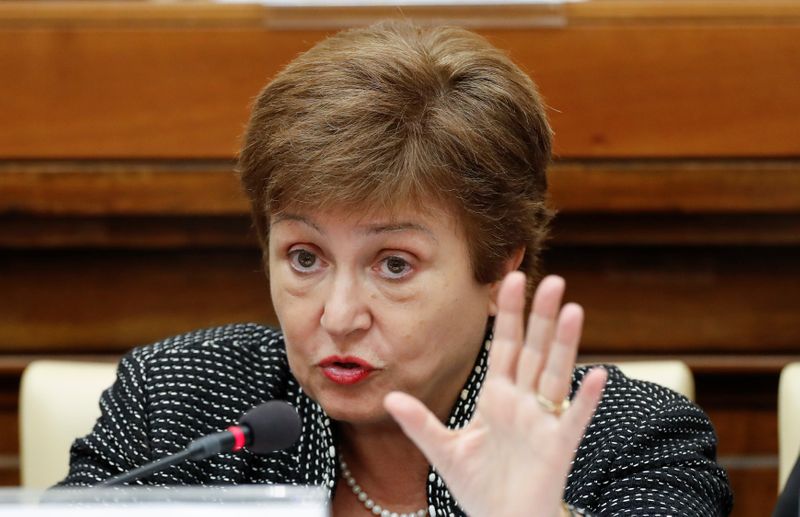By Andrea Shalal
WASHINGTON (Reuters) - Group of 20 countries should take strong policy actions to reverse a "dangerous divergence" that threatens to leave most developing economies languishing for years, the head of the International Monetary Fund said in a blog on Wednesday.
IMF Managing Director Kristalina Georgieva said "much stronger international collaboration" was needed to accelerate the rollout of COVID-19 vaccines in poorer countries, including additional funding to help them buy doses and reallocation of excess vaccines from surplus to deficit countries.
The IMF recently projected global GDP growth at 5.5% this year and 4.2% in 2022, but Georgieva warned that the outlook remained uncertain, citing concerns about different strains of the virus and the slow rollout of vaccines across most of the world.
"It is going to be a long and uncertain ascent," she wrote in a blog accompanying the IMF's surveillance note prepared for Friday's meeting of G20 finance officials, urging them to take action to prevent what she called the "Great Divergence."
"There is a major risk that as advanced economies and a few emerging markets recover faster, most developing countries will languish for years to come," she said. "If we are to reverse this dangerous divergence between and within countries, we must take strong policy actions now."
By the end of 2022, the IMF estimates that cumulative per capita income will be 22% below pre-crisis projections in emerging and developing countries, excluding China, compared to 13% in advanced economies and 18% in low-income countries.
The IMF is also seeing an accelerated divergence within countries, with job losses hitting the young, the low-skilled, women and informal workers disproportionately hard, and millions of children facing disruptions to education.
Ending the pandemic faster would add $9 trillion to the global economy by 2025, with some $4 trillion going to advanced economies, beating "by far" any vaccine-related costs, she said.
In addition to moves to accelerate vaccinations, Georgieva said vaccine production capacity should be significantly scaled up for 2022 and beyond, and policymakers should consider insuring vaccine makers against the risks of overproduction.
She called for continued, targeted fiscal support by G20 governments to support economies, and said central banks should maintain accommodative monetary and financial policies to support flow of credit to households and firms.
But she warned that continued monetary policy support had raised "legitimate concerns around unintended consequences, including excessive risk-taking and market exuberance."
G20 countries should also step up support to vulnerable countries through additional concessional financing, while leveraging private finance through stronger risk-sharing instruments and continuing work on debt relief, Georgieva said.
She said a new allocation of the IMF's currency, or Special Drawing Rights, would substantially boost countries' liquidity without increasing their debt burdens. It would also expand the capacity of donor countries to provide new resources, she said.
Italy, which leads the G20 this year, is pushing for a $500 billion allocation, a move backed by France, Germany and other big countries.

The United States had opposed such a move under former President Donald Trump, but has not yet communicated a firm position on a new SDR allocation under President Joe Biden.